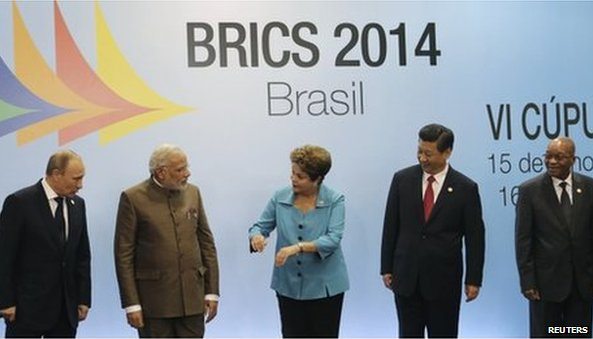The End of BRIC? End of an era for Brazil.
Brazil has seen a lot of criticism recently over its ineffective policies that have led to a worrying slowdown in the economy. This news clashes with the forecast twenty years ago by Goldman Sachs that the BRICS (Brazil, Russia, India, China and South Africa) countries would become wealthier than most of the current major economic powers by 2050.
The President of Brazil, Dilma Rousseff, even held a summit for the leaders of the BRICS during the 2014 World Cup period, where a foundation of a new BRICS development bank was announced head quartered in Shanghai, but this hype was followed with disappointing economic news. Only last week the Central Bank of Brazil surprisingly increased its cost of borrowing by 25 basis points, a move seen as an attempt to regain former credentials.
Currently, three of the five nations (Brazil, Russia and South Africa) have been displaying weak economic growth. China has seen great economic growth but inequality and the difficulty in rising from middle to high income has caused problems ,combined with dealing with difficult reforms.
In the most recent presidential elections investors were hoping for the kind of policies set out by Cardoso in the mid 90s that highlighted a pro-business agenda that could spark new growth. However, Ms Rousseff was re-elected, her leadership has witnessed a recession by definition (two consecutive quarters of contraction) and many are sceptical as to whether she can turn the slowdown around. The Brazilian people were deeply concerned about the government backing of sport events such as the 2014 World Cup despite the high level of poverty in the country.
Only a decade ago, Brazil boomed from soaring commodity prices and Federal Reserve money printing but now this has ended. Brazil’s poorer population benefited vastly from the boom, with many entering the middle classes that begun to emerge, thereby fuelling the descent into the Middle Income Trap, with expectations of a higher standard of living.
As salaries rose, the lower value industries that helped stimulate economic growth became less competitive as prices increased with wages causing the eventual slump that many emerging markets encounter especially in Latin America.
But unlike countries such as Singapore and South Korea, Brazil does not currently have significant investment in infrastructure and education or clear adherence to an open, free market that would aid the country in securing higher value industries that could turn it into an advanced economy
Rousseff has been very strict on limiting corruption, even sacking several ministers over corruption allegations earning herself the nickname ‘Iron Lady’ but there have still been problems occurring. Rousseff only won by a narrow margin and has already eagerly pledged to be ‘a much better president than I have been until now.’ Hopefully she will deliver and thus let more investment flow in to aid growth.
Overall, Brazil has seen a significant drop on growth and a large rise in inflation but still has time to recover, just as long as Rousseff begins the right policies to ensure this. At the moment the BRICS are at a weak point, with an unclear future as all face the challenge of advancing past the slump after witnessing initial massive growth.

Comments (1)
Você diz:”Rousseff tem sido muito rigorosa em limitar a corrupção…”
Isso é um grande desconhecimento da política interna do Brasil.ELA está sendo investigada como CORRUPTA e possivelmente sofrerá um impeachment